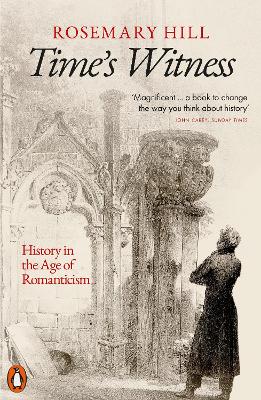
Time’s Witness
Rosemary Hill
£12.99
Description
From the Wolfson Prize-winning author of God’s Architect: Pugin and the Building of Romantic Britain
Between the fall of the Bastille in 1789 and the opening of the Great Exhibition in 1851, history changed. The grand narratives of the Enlightenment, concerned with kings and statesmen, gave way to a new interest in the lives of ordinary people. Oral history, costume history, the history of food and furniture, of Gothic architecture, theatre and much else were explored as never before. Antiquarianism, the study of the material remains of the past, was not new, but now hundreds of men – and some women – became antiquaries and set about rediscovering their national history, in Britain, France and Germany.
The Romantic age valued facts, but it also valued imagination and it brought both to the study of history. Among its achievements were the preservation of the Bayeux Tapestry, the analysis and dating of Gothic architecture, and the first publication of Beowulf. It dispelled old myths, and gave us new ones: Shakespeare’s birthplace, clan tartans and the arrow in Harold’s eye are among their legacies. From scholars to imposters the dozen or so antiquaries at the heart of this book show us history in the making.
Publisher Review
Hill is a magnificent historian and ... Time's Witness is a book to change the way you think about history. -- John Carey * Sunday Times * in this rich and absorbing study ... Hill has succeeded splendidly in her mission to rescue these often strange, eccentric but fascinating figures from "oblivion and the condescension of posterity". -- Paul Lay * The Times * Long meditated and meticulously researched, this book ... [is] presented in prose of unassertive grace and quiet wit ... what it offers is a rich feast, best consumed slowly and savoured, and Hill has assembled each course with magnificent erudition. -- Rupert Christiansen * Sunday Telegraph * immensely engaging... exceptional ... Antiquarianism was about making the past live again, and Hill makes the past of the antiquarians live again ... we can discern an innovative, sly and wry new form of non-fiction ... a beautifully written and very clever book which is psychologically astute -- Stuart Kelly * Scotland on Sunday * Not many writers could control this wide-ranging narrative with such clarity or assurance as here. Nor has Dr Hill succumbed to the temptation to tell in a long book what could be presented in a relatively short one. The result is outstanding: an engaging, incisive and thought-provoking exploration of the history of history in Romantic Britain. -- John Goodall * Country Life * She has accumulated a vast amount of detailed material and organized it impeccably into a witty and intelligent narrative which is both erudite and readable. If only all history was written this well. -- Clare Pettitt * Times Literary Supplement * impressive and stimulating ... At its heart, Time's Witness is a social and intellectual history that pays tribute to the role of antiquaries in recasting the way that British people understood and came to respect their distant national past. Hill seeks to rescue the antiquaries from "the condescension of posterity", and in that she succeeds admirably -- Tony Barber * Financial Times * Time's Witness retraces the antiquarians' journey into the past through the revolutions of the present ... Hill is an elegant stylist and vivid storyteller, and her account brims with anecdotes gathered from the little-known papers of her protagonists ... few could resist this sensitive, learned and amusing plunge into the historical imagination. -- Tom Stammers * Apollo * In this engaging survey ... by marrying scholarship and sensibility ... she achieves her stated aim of restoring history to the antiquaries and the antiquaries to history. -- Andrew Lycett * Spectator * "The history we have," Rosemary Hill writes in her preface to Time's Witness "is the history we want. It is the picture we choose to see in the clouds." Hill's book accordingly recreates, in magnificent detail, the cloud pictures conjured into being by the historians, writers, architects and artists and, above all, antiquaries who, between 1789 and 1851, reimagined the relationship between past and present in both Britain and France. -- Daisy Hay * BBC History Magazine * Time's Witness, which records with such verve the steady extension of subjects deemed fit for scholarly investigation two hundred years ago, is published at a moment when much of the curiosity and many of the pursuits it documents are endangered. -- Nicholas Penny * London Review of Books * Not everything that was false was fake, a theme that runs through Time's Witness, pushing us to think differently about the past, challenging our expectations of how that past should be recorded and interpreted and, above all, placing the Romantic sensibility and its embracing of subjectivity and imaginative reconstruction at the heart of historical enquiry. -- Adrian Tinniswood * History Today * in the best Romantic antiquarian tradition, the book is an engaging and densely detailed scholarly tome that reads a bit like a love letter, or at least an expression of infectious intellectual enthusiasm. Throughout Time's Witness, 'history' becomes visible as a succession of ideas and theories about the past that are continuously overlaid and revised in an ongoing process of exchange and accumulation. -- Sarah Watling * Literary Review *
Book experts at your service
What are you looking for?